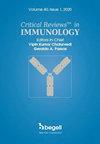Anoikis and Mitophagy-Related Gene Signature for Predicting the Survival and Tumor Cell Progression in Colon Cancer
IF 0.9
4区 医学
Q4 IMMUNOLOGY
引用次数: 0
Abstract
Background: Anoikis is a specialized form of programmed cell death and is also related mitophagy process. Objective:We aimed to identify an anoikis and mitophagy-related genes (AMRGs) prognostic model and explore the role of SPHK1 in colon cancer (CC). Methods: Bioinformatic methods were used to screen the AMRGs. Based on these genes, all the samples were divided into different subtypes. Furthermore, LASSO was conducted to optimized the AMRGs. Based on the optimal genes, a prognostic risk score model was established and evaluated. Finally, the effects of downregulated SPHK1 on the CC cell proliferation, migration, invasion, and anoikis were investigated. Results: Based on the AMRGs, all the CC samples were divided into subtype 1 and subtype 2. An AMRGs signature containing three key genes (SPHK1, CDC25C, and VPS37A) that exhibiting predicting ability in CC survival is confirmed. Subtype2 and low-risk groups exhibited better survival and higher immune cell infiltration. Moreover, down-regulated SPHK1 is related to lower cell proliferation, migration, and invasion ability, as well as higher anoikis in CC cell line (P < 0.01). Conclusion: The AMRGs risk score model exhibits promising predicting ability on patients with CC. SPHK1 might inhibit CC cell growth, migration, and invasion through stimulating anoikis.预测结肠癌存活率和肿瘤细胞进展的无丝分裂和有丝分裂相关基因特征
背景:目的:我们的目的是确定一个与有丝分裂相关基因(AMRGs)的预后模型,并探索SPHK1在结肠癌(CC)中的作用:方法:采用生物信息学方法筛选AMRGs。方法:采用生物信息学方法筛选 AMRGs,并根据这些基因将所有样本分为不同的亚型。此外,还通过 LASSO 对 AMRGs 进行了优化。在优化基因的基础上,建立并评估了预后风险评分模型。最后,研究了下调的 SPHK1 对 CC 细胞增殖、迁移、侵袭和厌氧的影响:结果:根据 AMRGs,所有 CC 样本被分为亚型 1 和亚型 2。包含三个关键基因(SPHK1、CDC25C和VPS37A)的AMRGs特征被证实具有预测CC存活率的能力。亚型2和低风险组的生存率更高,免疫细胞浸润也更高。此外,SPHK1的下调与CC细胞系的细胞增殖、迁移和侵袭能力降低以及瘤变增加有关(P < 0.01):AMRGs风险评分模型对CC患者具有良好的预测能力。结论:AMRGs风险评分模型对CC患者有很好的预测能力,SPHK1可能会通过刺激嗜酸性细胞抑制CC细胞的生长、迁移和侵袭。
本文章由计算机程序翻译,如有差异,请以英文原文为准。
求助全文
约1分钟内获得全文
求助全文
来源期刊
CiteScore
2.60
自引率
0.00%
发文量
14
审稿时长
>12 weeks
期刊介绍:
Immunology covers a broad spectrum of investigations at the genes, molecular, cellular, organ and system levels to reveal defense mechanisms against pathogens as well as protection against tumors and autoimmune diseases. The great advances in immunology in recent years make this field one of the most dynamic and rapidly growing in medical sciences. Critical ReviewsTM in Immunology (CRI) seeks to present a balanced overview of contemporary adaptive and innate immune responses related to autoimmunity, tumor, microbe, transplantation, neuroimmunology, immune regulation and immunotherapy from basic to translational aspects in health and disease. The articles that appear in CRI are mostly obtained by invitations to active investigators. But the journal will also consider proposals from the scientific community. Interested investigators should send their inquiries to the editor before submitting a manuscript.

 求助内容:
求助内容: 应助结果提醒方式:
应助结果提醒方式:


